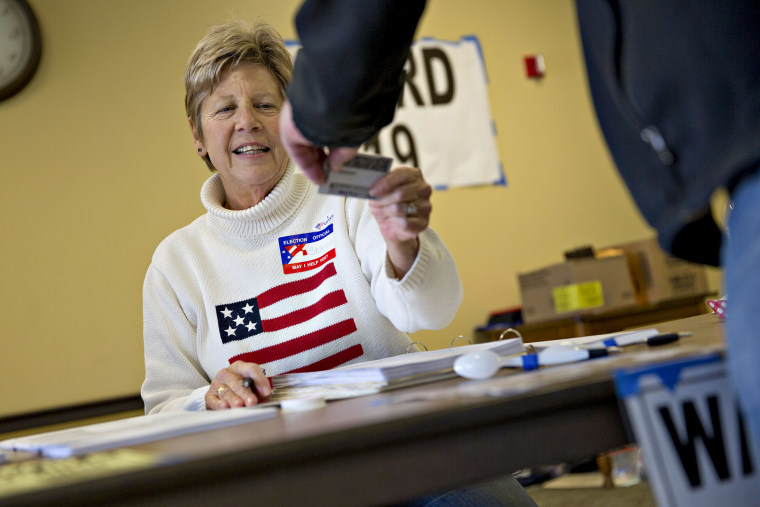A day after Wisconsin’s strict voter ID law helped cause long lines at the polls and kept some would-be voters from casting a ballot at all, a former GOP staffer told MSNBC his party actively intended for it to disenfranchise Democratic voters.
Todd Allbaugh, who served as chief of staff to a Republican state senator, said in an interview Wednesday that at a closed-door caucus meeting in 2011, GOP lawmakers openly discussed how the the ID bill would hit minorities and students hardest.
“One of the senators said, 'We need to think about the ramifications here, what this means, particularly in Milwaukee and college campuses across the state, what that could mean for us,'” said Allbaugh.
“What I’m interested in here is winning, and we need to use the opportunity, because if Democrats had the power to do it to us, they’d do it,” another senator said, according to Allbaugh.
"I was in the room when this thing was conceived and birthed," Allbaugh added. "Some bills work differently in reality than they were intended. This one worked exactly as intended."
RELATED: House Republican accidentally tells the truth about voter ID
Allbaugh, who now runs a Madison coffee shop, declined to name the senators who spoke. But on Tuesday night, U.S. Rep. Glenn Grothman, who was a state senator at the time, admitted that the law will help the GOP.
"Hillary Clinton is one of the weakest candidates they ever put up, and now we have photo ID, and I think photo ID is gonna make a little bit of a difference as well," Grothman told an interviewer. On Wednesday, Grothman said: "We feel if there's less fraud it'll help Republican candidates. We can't prove it, but that's what we think."
Allbaugh confirmed that Grothman was in the room for the 2011 caucus meeting. “He outed himself,” he said, referring to Grothman’s comments Tuesday. “People should take the congressman at his word.”
Grothman has denied to the Milwaukee Journal-Sentinel that he made the comments. “Either his memory is faulty or he’s outright lying,” Grothman said, referring to Allbaugh.
Dale Schultz, the then-senator for whom Allbaugh worked, didn’t respond to MSNBC's request for comment on Allbaugh’s coments. But Schultz, a moderate who voted for the ID law, told the Journal-Sentinel that Allbaugh’s “honesty and integrity are beyond reproach.”
Allbaugh originally described the caucus meeting in a Facebook post Tuesday that drew widespread attention. Without naming names, he wrote that some GOP senators were “giddy” about the law’s ability to suppress Democratic votes. Allbaugh told MSNBC that he was inspired to write the post after a young employee at his coffee shop found himself disenfranchised by the ID law because he has an out-of-state driver’s license.
Allbaugh’s revelations came a day after Wisconsin’s ID law, which was championed and signed by Gov. Scott Walker, caused problems in the state’s primary elections. In Green Bay, some voters waited over two hours to vote, a problem the local election administrator blamed on the law. “It just plain slows things down," he told MSNBC.
College students faced particular hurdles, with many needing to first wait in long lines to obtain a voting ID before heading to the polls to vote. Several universities reported lines of over an hour, according to Election Protection, a group that monitors voting. An estimated 300,000 Wisconsinites don’t have the ID needed.
Some argue that Tuesday's record turnout suggests concerns about the ID law are overblown. In a tweet sent Tuesday, MSNBC's Joe Scarborough said opponents of the law should stop "whining," citing the high turnout.
Thursday morning, a federal court heard arguments from the ACLU and others who are seeking to have the law’s ID requirements softened. An earlier challenge to the law was rejected by a federal appeals court.
